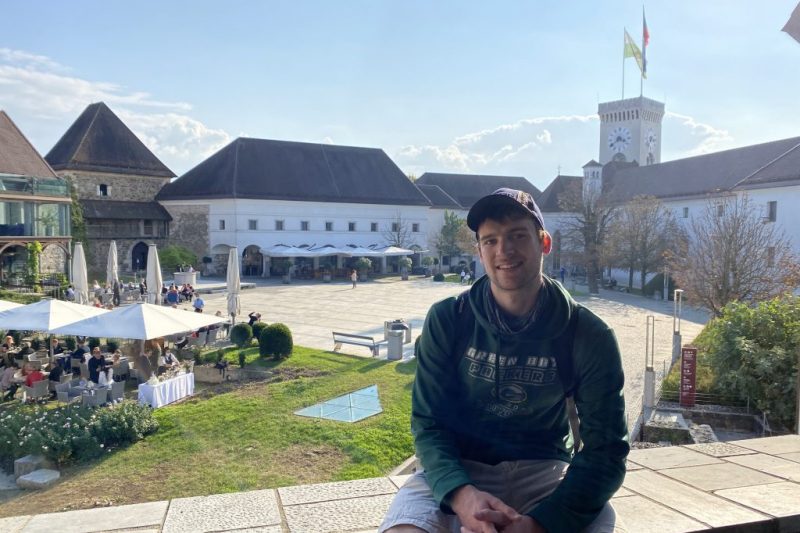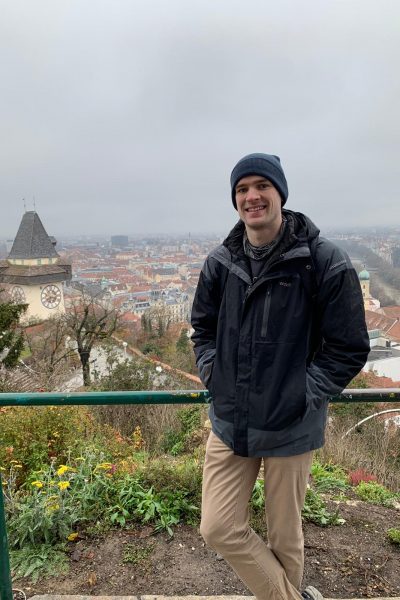‘Abundantly Thankful’ in Austria Despite COVID-19, Jared Nickodem '20 was able to make it to Austria, where he is teaching English to students as part of the U.S. Teaching Assistant Program.
“Since it is a new experience for me, I have enjoyed learning how to be a better teacher. I think that is a useful skill for any situation in life.”
~ Jared Nickodem ’20
Hometown: Cedarburg, Wisconsin
Major: Politics, European History
Minor: German
Q: Were your post-graduate plans impacted by COVID-19?
The pandemic affected my decisions a lot. I had also applied to the Fulbright program to teach English in Serbia, and I was selected as an alternate in spring, but then the program was postponed until January. When I was accepted to the Austrian USTA program and was told it would start on schedule, I immediately accepted even though I was later upgraded to a finalist for the Serbia program. But even so, this was clearly the best choice because I am able to get a full year’s experience.
I arrived in Austria in September 2020, at which point travel and entry into Austria was permitted for specific purposes outlined by the government, and fortunately our program fell within those boundaries. I thought I was going to need a special work visa, but in the end the program provided us with letters from the Austrian government certifying that we were authorized to enter. I had to flash that letter a few times in the airports, along with my Covid-19 test results, but all in all it went surprisingly smoothly, and now I am just abundantly thankful to have been able to make it here.
Q: How is the COVID response in Austria different from the U.S.?
The pandemic is being handled quite differently in Austria, and I think much of it comes down to the style of government. In the United States, we still have a very federalized system, so the state and local authorities have a lot of power to set their own policies about lockdowns, mask mandates and whether to remain open. In Austria, and I suppose in most of Europe, power tends to be more centralized in the national government, and most European governments do more or less the same thing because of their close cooperation through the EU. The Austrian chancellor can get in front of a camera and say we are going into a second or third lockdown, and describe exactly what people may and may not do across the entire country, which is exactly what he did and has been doing since the beginning of November, when cases rose very sharply.
Since then, almost all of my classes have been online, no restaurants or bars have been open, and travel is more heavily controlled. Restrictions are likely to be relaxed soon, but this is still quite different than what many Americans are experiencing today. Something else that struck me is how acquiescent people here are to the regulations. Within a couple days of an order that only a specific kind of mask may be worn in stores, everybody I saw at the grocery store had this exact mask on, even though they had previously been wearing many different styles of masks. I think this very close obedience is a stark contrast to the more rebellious and individualistic nature we see in many Americans. Not to say that one side is better or worse; I think both have their virtues depending on the situation. It has been interesting to observe a different side of the pandemic, but I hope this is over soon. I put my name on a vaccination signup list, so hopefully I’ll get it within a couple months.
Q: What can you tell us about your time in Austria so far?
I arrived in Eisenstadt in mid-September and started work as an assistant English teacher in October. I coordinate with the English teachers at two different schools in the small town of Oberpullendorf and visit various classes, each once per week, to give lessons on a variety of topics, depending on the class and their skill level and interests. I have taught about the 2020 U.S. elections, American holidays, American food, and popular tourist destinations, and I have also helped reinforce the topics that the teachers have been focusing on.
Oberpullendorf is about an hour away from Eisenstadt by bus, so I have to get up early to make it by the start of school on days we have in-person classes. Those are the days I like better because there is more structure and more direct contact with the teachers and students. I usually teach 2-4 classes a day, until about 2-2:30 p.m. at the latest, and I’m usually home by 4 p.m. That leaves plenty of time to make food, prep classes for tomorrow or the day after, and maybe hang out with some of the students at the dorm where I live in Eisenstadt.
Q: What’s been the most challenging part of the USTA experience so far?
I’ve never been a teacher before, so it’s a totally new experience, and it’s far from easy. Preparation takes a long time, and sometimes classes are difficult to control. Since I have no influence over their grades, I don’t have a great deal of power to motivate their respect for or participation in what I try to do with them. But the hardest part for me has been trying to figure out whether my lessons are actually helping the students progress in English and improve their cultural understanding. I never see the same class more than twice a week, so it’s difficult for me to learn the names of the students, never mind observe improvement over time. I try to communicate about that with the teachers, to ask them what I can do to ensure that my lessons are effective so that I can improve as a teacher.
Q: What have you found rewarding about the work?
Since it is a new experience for me, I have enjoyed learning how to be a better teacher. I think that is a useful skill for any situation in life. I’ve also had a great opportunity to improve my German language skills. I intend to be very strong with the language by the end of my time here. It has also been really cool to learn about the Austrian education system, which is much more complex than the American one. More generally, the program is giving me the opportunity to live abroad for a year, in a different culture with different systems and people. In my dorm, there are people from all over Europe and many immigrants from the Middle East, so interacting with them and hearing their perspectives on the world has been really interesting.
Q: How did W&L prepare you for this experience?
I can’t say enough about how much W&L did to prepare me for this. I have to give thanks to two faculty members in particular. Professor Debra Prager helped me immensely by teaching me German, but moreso through a Spring Term Abroad program in Graz, Austria, which was my first real academic experience abroad. She showed me how to take on a challenge like that with confidence. That confidence and that ability to adapt to a different place and understand it has helped me quite a bit this year. In addition, Dick Kuettner’s class on teaching world languages, which I took during my senior year, was a wonderful introduction to teaching, and I have put what I learned in his class into practice here in Austria.
Q: What’s next on the agenda for you after the USTA?
I will apply to do another year of teaching in Austria, but I have also applied to the Fulbright again for Serbia. I will do at least one more year teaching English and living abroad, and after that, it remains to be seen. I have tossed around the idea of studying for a master’s degree in international relations or something like that, or finding my way into the State Department, possibly through internships at embassies or back in Washington, D.C.
If you know any W&L alumni who would be great profile subjects, tell us about them! Nominate them for a web profile.
 Jared Nickodem ’20 on a foray to Ljubljana, Slovenia from Austria, where he is teaching s part of the U.S. Teaching Assistant Program.
Jared Nickodem ’20 on a foray to Ljubljana, Slovenia from Austria, where he is teaching s part of the U.S. Teaching Assistant Program. Jared Nickodem ’20 in Austria, where he is teaching English as part of the U.S. Teaching Assistant Program.
Jared Nickodem ’20 in Austria, where he is teaching English as part of the U.S. Teaching Assistant Program.
You must be logged in to post a comment.